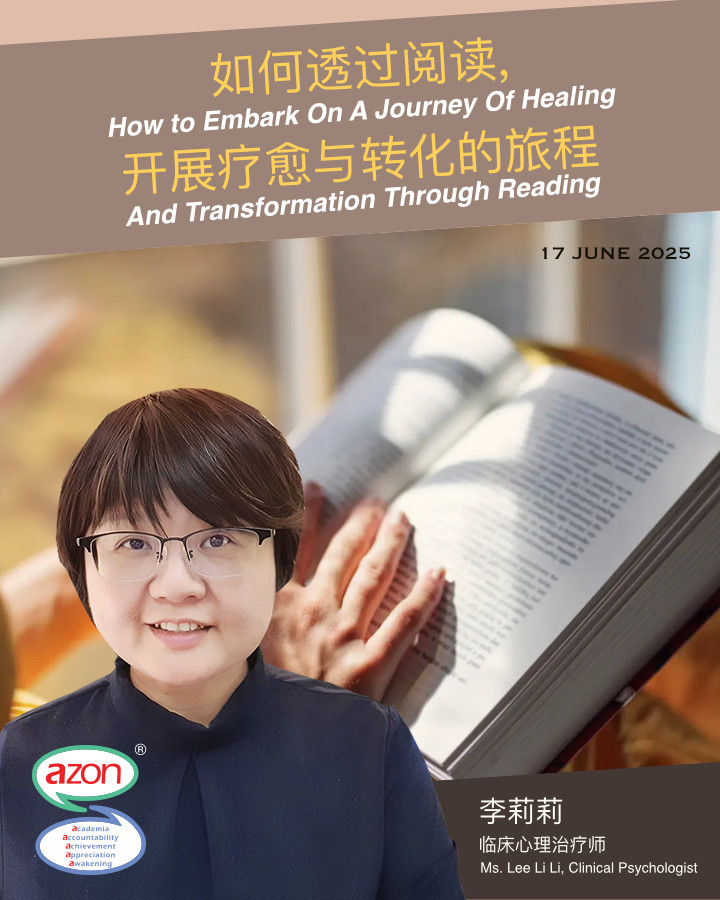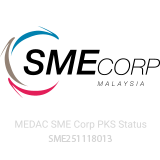
Title: How to Embark On A Journey Of Healing And Transformation Through Reading
Speaker: Ms Lee Li Li, Clinical Psychologist
Date: 17.06.2025 (Tuesday)
Everyone will face both favourable and challenging situations in our work and daily lives, reading a motivational quote from a book can guide us to better self-reflection. This highlights the importance of reading: it helps us grow, assist in processing negative emotions, letting us achieve self-healing for our souls.
A. What is Bibliotherapy?
B. Types of Books and Suitable Readers
C. Psychological Self-Regulation Techniques during Reading
D. Why can Reading be Healing?
E. The Five Stages of Bibliotherapy
Stage 1: Quiet Entry
7-Day Emotional Healing Plan
This is an intensive emotional release plan suitable for individuals with significant mood fluctuations, during times of high stress, or those looking to quickly recharge their energy. The goal of this plan is to release emotions and stabilise one’s inner self within 7 days, restoring one’s sense of hope.
21-Day Emotional Healing Reading Plan
The goal of this plan is to regulate emotions, rebuild psychological resilience, and regain inner peace. This plan suggests 15-30 minutes of daily reading, with an additional 5 minutes for reflection if needed. It is ideal for those experiencing anxiety, depression, self-doubt, loneliness or emotional exhaustion. The plan can be carried out during quiet, reflective times, such as in the morning or evening. The structure of the 21-day plan is similar with the 7-day plan:
In conclusion, bibliotherapy is not about avoiding emotions but learning to coexist with them. A book may not solve all your problems, but it can accompany you through your loneliest moments. May you meet the kindest version of yourself in the pages of a book.
Speaker: Ms Lee Li Li, Clinical Psychologist
Date: 17.06.2025 (Tuesday)
Everyone will face both favourable and challenging situations in our work and daily lives, reading a motivational quote from a book can guide us to better self-reflection. This highlights the importance of reading: it helps us grow, assist in processing negative emotions, letting us achieve self-healing for our souls.
A. What is Bibliotherapy?
- A method for emotion regulation: By reading words, we engage in a conversation with our own positive or negative emotions, and through cognitive transformation, obtaining strength. In words, we can find who we are and get along with our emotions.
- A form of self-care: By reading literature, psychology, philosophy or stories, individuals are guided to recognise emotions, express emotions, self-reflection, and achieving psychological growth.
B. Types of Books and Suitable Readers
- Literature Healing: Suitable for individuals who are emotionally repressed or in need of emotional release. These types of books serve as their emotional outlet, soothing their emotions.
Suggested Readings: 《The Kite Runner》, 《 To Live》, 《One Hundred Years of Solitude》 - Psychological Self-Help Healing: Suitable for individuals experiencing anxiety, mild depression or those who are introspective and wish to manage their emotions.
Suggested Readings: 《Counselling for Toads: A Psychological Adventure》, 《Emotional First Aid: Healing Rejection, Guilt, Failure and Other Everyday Hurts》 - Philosophical-Cognitive Healing: Suitable for individuals who feel lost or are struggling with existential confusion.
Suggested Readings: 《The Power of Now: A Guide to Spiritual Enlightenment》, 《The Road Less Traveled》 - Spiritual or Mindfulness-Based Healing: Suitable for those experiencing emotional ups and downs or seeking inner calm.
Suggested Readings: 《The Courage to be Disliked》, 《修炼心智》 - Writing-Participatory Healing: Suitable for those who wish to engage in writing and self-reflection, using book as a tool for personal growth.
Suggested Readings: 《The Miracle Morning》, 《Writing Down the Bones》
C. Psychological Self-Regulation Techniques during Reading
-
Set Relaxed Reading Goals
- Enjoy the Reading Itself: Don’t focus on “finishing the book”. Avoid setting too many rigid rules that pressure yourself into reading. Instead, focus on enjoying the process.
- Develop a Steady Rhythm Gradually: Start with reading 10 pages a day. Build a reading habit slowly without putting too much stress about the progress, this helps cultivate a long-term habit for reading.
-
Reading Environment
- Create a comfortable reading atmosphere: Set up a quiet and cosy reading corner to make the experience more therapeutic.
- Reading surroundings: Soft background music or aromatherapy can help calm the mind.
-
Empathise with Characters to Release Emotions
- Emotional resonance through text: Find emotional projections of yourself within the story. Allow yourself to cry or feel moved during touching, sad or inspiring moments as a way of emotional release.
-
Record your Feelings after Reading
- Organise emotions: Use a voice recording app to capture your thoughts, which helps process and internalise the content.
- Self-reflection: Writing reading notes or reflections can support personal growth.
-
Avoid “Forced Reading”
- Psychological flexibility: If you can’t get into a book, switch to another one. Don’t treat reading as a task - the focus of emotional regulation is on the experience itself.
D. Why can Reading be Healing?
- A Space for “Psychological Projection”: Reading allows us to project ourselves onto the characters in a story, allowing us to find expression and emotional resonance.
- Activates “Emotional Understanding”: Through reading, we realise that “I’m not alone”, allowing us to understand that the journey toward success is often more meaningful than success itself.
- Slows down the inner pace: Reading helps us slow down, which in turn calming the nervous system.
- Awakens inner language: Beautiful or truthful sentences can deeply touch the soul, inspiring personal growth.
E. The Five Stages of Bibliotherapy
Stage 1: Quiet Entry
- By opening the book, we temporarily escape from reality, allowing our overloaded emotions to find a moment of peace.
- During the reading process, we find expressions that mirror our own, fostering empathy with the material.
- Through crying, silence or reflection while reading, it helps us to release emotions and alleviating our pain.
- Reading enables us to shift our perspective, rebuild our cognitive framework, and guide us to view problems from new angles.
- After reading, we carry a meaningful sentence or ideology in our hearts, internalising it to provide support and strength.
7-Day Emotional Healing Plan
This is an intensive emotional release plan suitable for individuals with significant mood fluctuations, during times of high stress, or those looking to quickly recharge their energy. The goal of this plan is to release emotions and stabilise one’s inner self within 7 days, restoring one’s sense of hope.
- Awareness Phase (Day 1 to Day 2): Locate your emotions and describe your pain. On Day 1, reflect on your dominant emotions – what are your feelings? Have you been suppressing any emotions? By Day 2, try finding resonance and allow yourself to feel understood, with the comfort of words soothing you – that you are not alone.
- Healing Phase (Day 3 to Day 5): Comfort your inner self and release your emotions. On Day 3, allow your emotions to express freely, without suppressing them. On Day 4, slow down and embrace the “present moment”. On Day 5, release self-doubt and reconnect with your self-worth.
- Restructuring Phase (Day 6 to Day 7): Regain your strength and reignite your hope. On Day 6, reignite your sense of hope, telling yourself that your fate is far from over. By Day 7, start integrating the lessons of the past week and take away a gentle, healing gift.
21-Day Emotional Healing Reading Plan
The goal of this plan is to regulate emotions, rebuild psychological resilience, and regain inner peace. This plan suggests 15-30 minutes of daily reading, with an additional 5 minutes for reflection if needed. It is ideal for those experiencing anxiety, depression, self-doubt, loneliness or emotional exhaustion. The plan can be carried out during quiet, reflective times, such as in the morning or evening. The structure of the 21-day plan is similar with the 7-day plan:
- Phase 1: Relaxed Awareness Phase (Day 1 to Day 7)
- Phase 2: Deep Healing Phase (Day 8 to Day 14)
- Phase 3: Restructuring and Hope Phase (Day 15 to Day 21)
In conclusion, bibliotherapy is not about avoiding emotions but learning to coexist with them. A book may not solve all your problems, but it can accompany you through your loneliest moments. May you meet the kindest version of yourself in the pages of a book.





